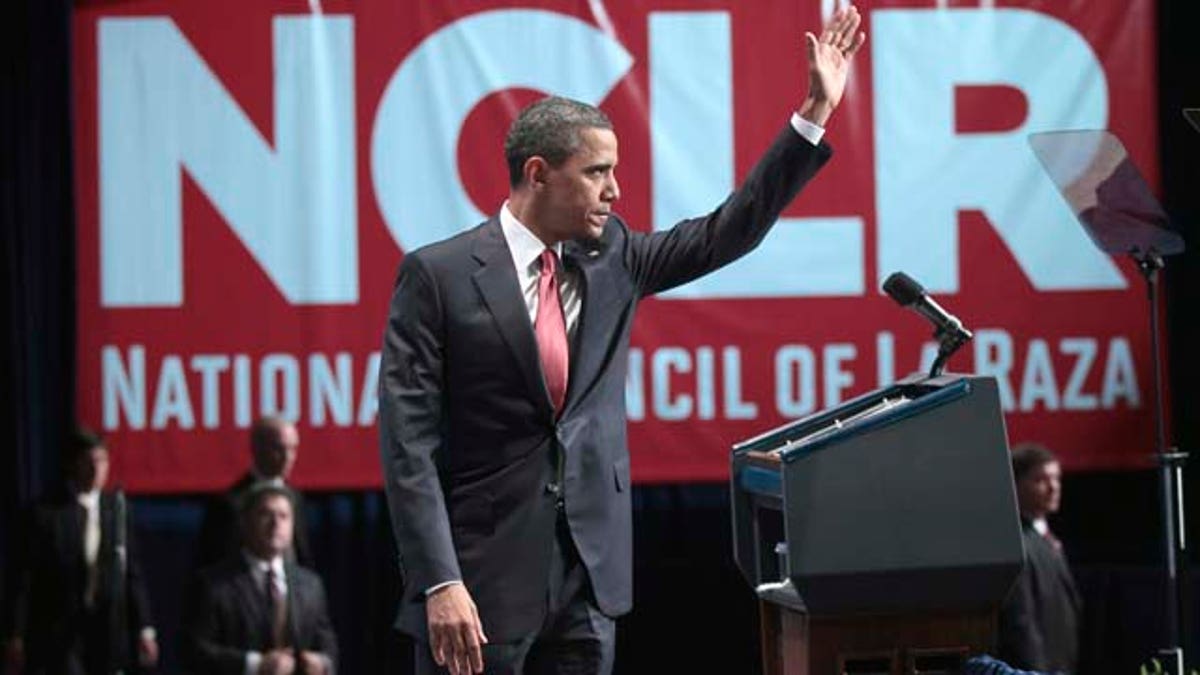
President Barack Obama waves as he prepares to walks off stage after delivering remarks at the National Council of La Raza (NCLR) annual conference luncheon in Washington, Monday, July 25, 2011. (AP Photo/Pablo Martinez Monsivais) (AP2011)
White House officials met with dozens of Latino community leaders in New York Tuesday to hear their ideas and concerns, part of a series of similar meetings the Obama administration is holding across the country.
Billed the White House Hispanic Community Action Summit, leaders from fields as wide-ranging as education, small business, healthcare, politics and social services discussed the Latino community’s needs in those areas.
They broke up into groups, in which people from New York, New Jersey and Connecticut shared stories about problems they encounter and about solutions they found that others might find useful as well.
At the summit, held at Baruch College of the City University of New York, Obama administration officials told the crowd about federal programs that were available to help the leaders fill the needs in their community.
One of the attendees, César Cardenas, the director of Intergovernmental Affairs for the New York City Workforce Investment Board, said he valued the chance to brainstorm with leaders from other sectors and to have discussions with White House officials.
“I hope to make connections here, with stakeholders, to get better access [for the community] to capital and education” among other things, he said.
Daniel Diaz, who is the parent advocate for the New Haven [Conn.] school district, said: “Immigrants come with the same dreams, they have the same dreams as everyone else, they want their children to have good education. This gives people like ourselves the chance to get outside of own communities and find out about what people across the nation are doing and get ideas.
“And it’s good for the White House to talk to Latinos outside the area of the White House, of Washington D.C., and for us to have a voice,” Diaz added.
At the same time, he added, it was important for community leaders to become informed about federal programs they can avail themselves of to help the people they serve.
“More resources need to be put to get greater parental involvement” in communities that have a large number of immigrant parents, he said, who are in need of guidance about how to navigate the U.S. school system.
Juan Sepulveda, director of the White House Initiative on Educational Excellence for Hispanic Americans, said that the White House, under several administrations, long had sent out representatives from the program to speak with Latinos about educational issues.
“People said to us, ‘My kids don’t have healthcare, my husband doesn’t have a job,’” Sepulveda said. “They had immigration issues. These issues were all connected to education.”
So back at the White House, he said, it was decided that administration officials who specialize in different areas should also meet with Latino community leaders.
“We said, ‘Let’s take the administration on the road,’” he said. “We’re telling people ‘You tell us what the issues are.’”
The White House has at least 30 more Latino summits is planning, Sepulveda said.
Some greet the outreach effort with skepticism – the 2012 election, after all, is coming, and the president has taken hits in polls.
“That’s the first question I get from people,” Sepulveda said. “'Are you doing this because of the election, it is a purely political move?'”
Many Latinos, like other Americans, are worried about the economy, are dealing with unemployment, foreclosures and bankruptcies. And those who were hoping for a comprehensive immigration reform package – which Obama promised he would accomplish in his first year in office – have expressed disappointment in the failure of Congress to agree on a bipartisan measure.
Sepulveda said the summits are not an election-season ploy.
At the same time, he said, it does give the administration a chance to let Latinos know what Obama has done for them, such as suspending deportations while it reviews each case and prioritizes those involving criminals.
“It’s a broken system right now,” he said about immigration. “We’re changing priorities.”












































